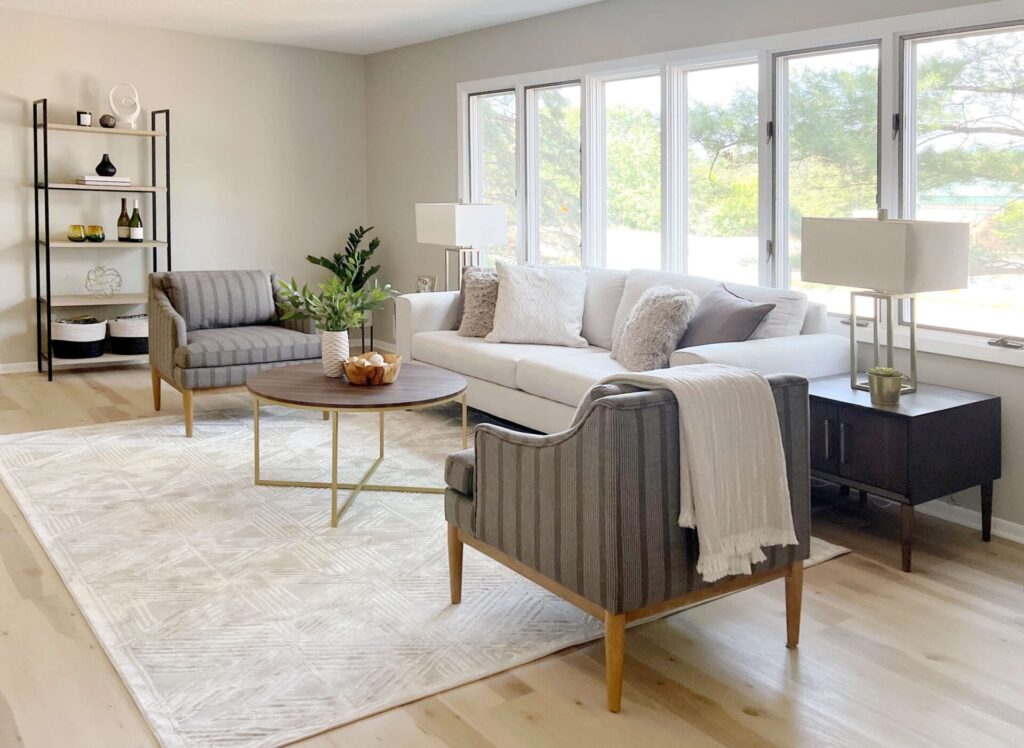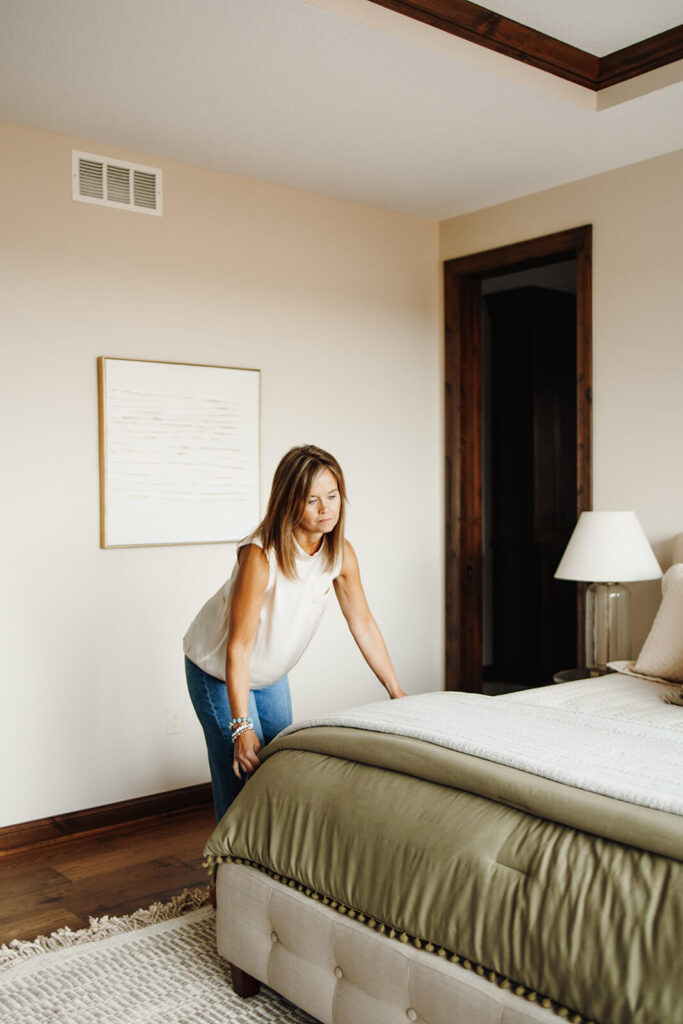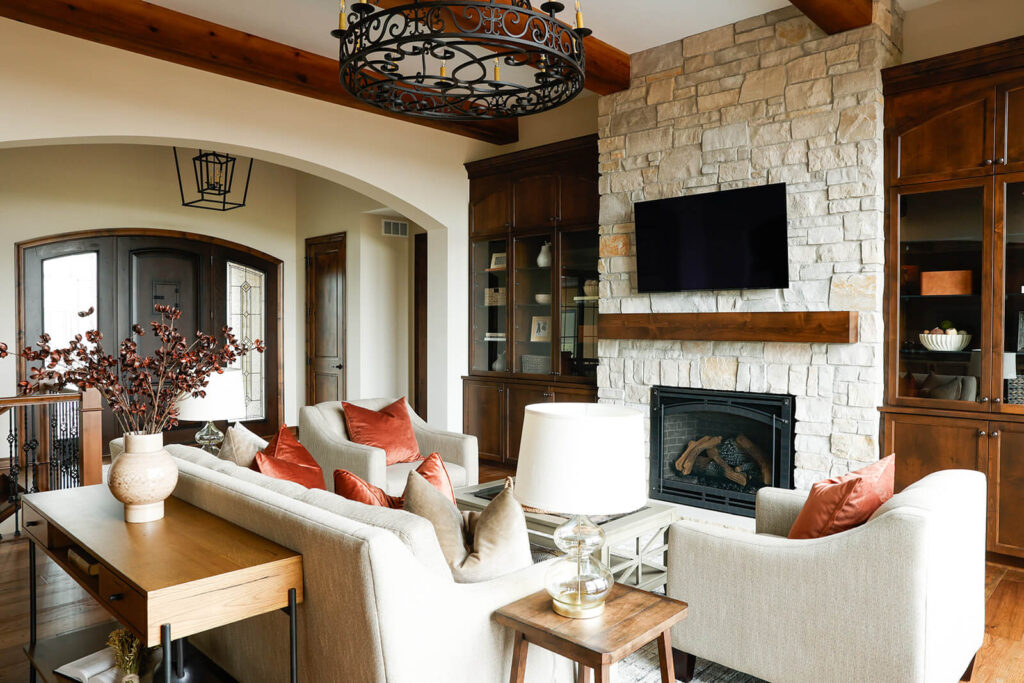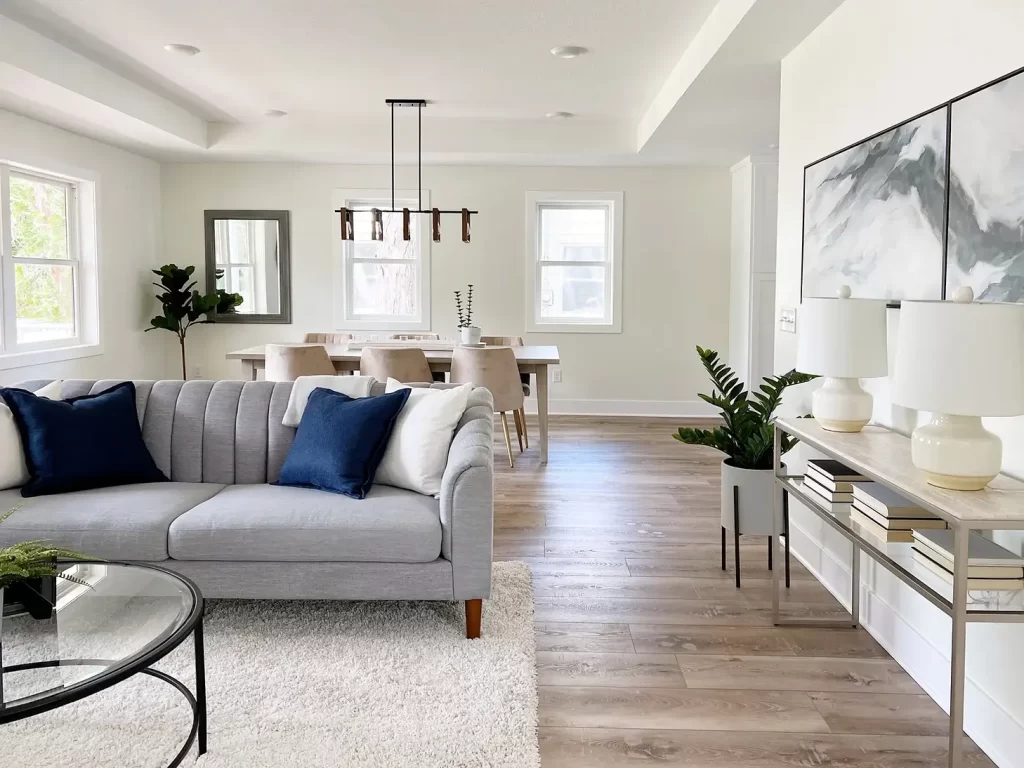After many years in the home furnishings industry as an art director & photo stylist, RESA® Member, Susie Passons decided it was time to take her skills, talent and eye for design and start a transition out of the 9-5 routine.
I picked hundreds of paint colors, and styled countless rooms inside a photo studio. I had to make the rooms look perfect, and then help determine how the photographer was going to shoot it.
Susie launched SP Design in 2016 where she serves sellers and agents in the Twin Cities and beyond, partnering with them to prepare homes to sell quickly, and for top dollar. SP Designs offers staging and design consultations, vacant and occupied staging, as well as new construction or remodeling design services. She understands what rooms will look like through a camera lens, and she understands how to create emotion through staging and design.
Susie is a current member of the RESA® Minneapolis Chapter where she served as chapter secretary in 2021 and 2022.
Relationship building is an essential part of the brand of SP Design, and is woven through every aspect of the company.
In 2023, Susie was named as one of RESA®’s Top 100 Most Influential People in Real Estate Staging and we were very excited to help her celebrate that win with us at The M Resort during RESACON Vegas.

The Home Stager’s Perspective: A Conversation with Susie Passons
Q: How does your commitment to RESA®, the exclusive nonprofit trade association for stagers, align with your professional goals and values?
Susie: As a member of RESA® for the last five years, I have learned how to grow a business with confidence because of the resources and people associated with the organization. I find the relationships with other stagers to be invaluable. This can feel like an isolating industry, but through RESA® I have so many colleagues that I actually consider friends. We bounce ideas off one another, refer one another, and genuinely try to help one another grow and succeed.
Q: What inspired the beginning of your staging journey?
Susie: I spent 7 years in the furniture industry as an art director and photo stylist. I was essentially staging rooms inside a photo studio. I learned a ton but eventually, I didn’t like the 9-5 thing anymore, and I wasn’t making the money I felt I deserved. After another standard cost-of-living pay increase at my annual review, I called in sick and filed my LLC for SP Design. I continued to work full-time for a year while I began my staging business. I really developed it through a lot of trial and error, and “fake it ’till you make it”. I said YES to pretty much anything that came across my path in terms of staging.

ALL PHOTOS PROVIDED BY SP DESIGN
Q: Take us back to your very first day on the job as a home stager. What were your feelings, expectations, and the most memorable moments from that day?
Susie: One of my first vacant stagings was for a model for the Parade of Homes. The brand new air mattress wouldn’t hold air; so the morning the POH opened, I was driving back to the house with a mattress strapped to the top of my SUV to remedy the problem. Even with that stress, I was completely in love with staging, and with owning my own business.
Q: How has your perception of the staging industry evolved since you started?
Susie: Staging is not for people who simply like to decorate. And it’s not for people who think it’s all just “fun” because they see the beautiful photos at the end of a job. Staging is strategic marketing of a home to buyers. You need the ability and desire to run a profitable business in a competitive industry. I have learned that having a business owner mindset needs to be my foundation.
Q: Would you share some insights into your creative process? Where do you typically find inspiration for your staging designs, and how do you translate that into your work?
Susie: I love going to market to be inspired. Instagram, of course, is where I get a lot of inspiration. I usually have one inspiration piece like a rug, a piece of art, or a pillow color that I use to begin planning for a job. I also really like the annual Sherwin-Williams color preview event every year.

Q: Staging can transform a property, but it’s not just about aesthetics. How do you balance design principles with the practical aspects of making a home more marketable?
Susie: My style is clean and somewhat simple. I don’t overcrowd rooms with too much furniture, or the wrong size furniture. In consultations with sellers, I explain the concept that we live in our houses differently than we sell them.
Q: Beyond aesthetics, what do you believe are the most important qualities or skills that a successful home stager should possess? How have these qualities shaped your own career?
Susie: SP Design has never had debt. I started by using only the money that was coming in from a staging job. Slowly I grew my inventory from one headboard to a warehouse full of furniture and decor. All while being debt free and highly profitable over the past several years. I think you need a tremendous amount of tenacity to start a small business. You have to have guts, resilience, faith, and a strong support system to get through the hard days.
Q: In the world of home staging, sometimes surprises happen. Could you share a funny or unexpected moment that occurred during one of your staging projects? How did you handle it?
Susie: The heat suddenly wasn’t working at a house on a January day in Minnesota. We staged the house while wearing hats, gloves, and jackets. Later I learned that I just needed to switch the thermostat to the on position.

Q: Prior to entering the staging industry, did you have a different career path or profession? If so, please share some details about it. How have the skills and experiences from your previous career uniquely equipped you for success in the world of staging?
Susie: My degree is in graphic design. My previous work experience is as an art director and photo stylist for a furniture retailer. I picked hundreds of paint colors, and styled countless rooms inside a photo studio. I had to make the rooms look perfect, and then help determine how the photographer was going to shoot it. I was part of the marketing team, so I understood branding and the importance of marketing yourself even very early in my staging journey.
Q: Can you recall a particularly challenging staging project? What obstacles did you face, and how did you overcome them? What did you learn from that experience?
Susie: I have learned the luxury market is not for me. I would rather completely stoke the homeowner & agent of a $700,000 house, than battle the expectations of the owner of a $3M house.
Q: Staging often involves collaboration with real estate agents. Could you share some insights into how effective communication and partnership between stagers and agents can lead to successful property sales?
Susie: I highly value my agent relationships. They realize that staging elevates their listings, and helps obtain a higher, faster offer. I strive to serve them well with professionalism, good communication, and a staged listing that will make them say, “wow!”

Q: If you could collaborate with any famous interior designer or decorator, living or deceased, on a staging project, who would it be and why? What do you think you could learn from them?Susie: I love all things Studio McGee. I would love to shadow Shea for a year and learn!
Q: What are some common misconceptions or objections you’ve encountered about home staging, and how do you educate potential clients or naysayers about the benefits it brings to the selling process?
Susie: I always let sellers know that staging is marketing, and that i am looking at a house through a buyers perspective: what are they going to think, feel, and see. We’re selling the house, not the homeowners things within the house.
Q: How can real estate agents better communicate the value of staging to their clients, and what role can they play in making the staging process smoother and more effective?
Susie: Sharing stats with sellers can be a usual tool to help them understand the value of staging. Agents that offer a staging consultation help sellers see the importance of getting their house ready to list. You can’t just throw a house on the market anymore, and expect a great offer.
You can find out more about Susie and SP Design at https://www.susiepassons.com/
- Messy Branding, Messy Business: Key Takeaways from Laurie Graham’s Webinar - February 24, 2025
- Key Takeaways from Holly Gosa’s Exclusive RESA® Webinar - January 8, 2025
- Ultimate 2025 Success Plan for Stagers: Insights from Marianne Cherico - December 28, 2024


